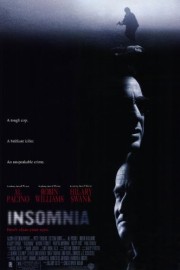Insomnia
Following his breakthrough with “Memento,” Christopher Nolan became a major Hollywood filmmaker, directing blockbusters while continuing a focus on damaged individuals whose issues manifest themselves in morally compromising ways. That theme continued to crystallize in his 2002 remake of “Insomnia,” a Norwegian thriller about a city detective whose inability to sleep while assisting in a small town murder investigation is a reflection of how far off his moral compass is. A fitting comparison might be either version of “Bad Lieutenant,” but unlike that officer, this one wants to do right, but the realities of legal proceedings sometimes means the bad guys get away.
In Nolan’s “Insomnia,” the main detective is Will Dormer (Al Pacino), an LA cop who is sent, with his partner Hap (Martin Donovan), to a remote town in Alaska to aid in a murder investigation of a young girl. They are greeted by a local detective (Ellie Burr, played by Hilary Swank) who looks up to Will, and is excited to be working on this case with him. The official reason they’re up there is for consulting, but there’s a possibility Will and Hap have been sent up there because of an Internal Affairs investigation that Will is at the center of. IA has started talking to Hap, which doesn’t necessarily bode well for Will, making it even worse when, while on a stakeout, they are chasing a suspect in the fog, and Will accidentally shoots Hap, killing him. It’s not as straightforward as all that, though, especially when the girl’s killer, Walter Finch (Robin Williams), takes a vested interest in Will’s plight, which is an inability to sleep because the sun doesn’t set in this Alaskan town. However, maybe it’s something else?
Even though “Insomnia” is the only one of his films where the screenplay is not credited by either Chris or Jonathan Nolan (Hillary Seitz gets credit for the adaptation), this is a Christopher Nolan film through and through. In all of his films, there’s something in the main character’s past that they can’t shake, that keeps them from finding a peaceful state of mind. In most cases with Nolan, it’s the loss of a loved one, like Bruce Wayne’s parents in his “Dark Knight” trilogy, or Robert Angier’s wife in “The Prestige,” but in “Insomnia,” what Will Dormer has lost is his sense of right and wrong. By trying to make sure justice is served, he compromises his oath as a cop to uphold the law. Of course, for much of the movie, we don’t know that, but we sense it. In Hap’s confession to his partner that he was thinking of cutting a deal. In Will’s determination to help Ellie as a mentor, even when he bends the rules for himself. In Ellie’s keen eye to details when she finds a newspaper hidden behind a cabinet. And, of course, the flashes to things from the past that, coupled with the neverending sunrise, make it impossible for Will to sleep. As with all of Nolan’s protagonists, Will is trying to redeem himself, and reconcile with his past. But this case, with it’s not-so-clear cut evidence, challenges him in a way that makes that difficult, although with someone like Ellie aiding him, maybe peace is within reach.
The three main actors all do exceptional work under Nolan’s direction. The main standout is Williams, who had a fantastic 2002 with superlative work in not only “Insomnia,” but also “One Hour Photo” and the much-maligned “Death to Smoochy.” As Finch, the consummate entertainer is gone, and replaced with an icy, but reassuring sociopath who thinks he has Will right where he wants him. How Williams failed to receive an Oscar nomination in 2002 for any of his performances is beyond me, because whether you’re talking about “Insomnia” or “One Hour Photo,” or even “Smoochy,” it was a banner year for the late, great talent. As Ellie, the small town cop who hasn’t really dealt with big, important cases yet, Swank is wonderful, reminding the viewer that her Oscar-winning work in both “Boys Don’t Cry” (which came before this film) and “Million Dollar Baby” (which came after) was no fluke, even if there’s a lot of evidence to the contrary over the past few years. And as Will, Pacino has one of his meatiest roles in a long while, one which plays off of his naturally weary looks, and gives him more to do than just do another over-the-top parody of his previous work. This is a genuine performance, and one that pushes Pacino to the limits exceptionally well. That the film basically is seen as a studio assignment for Nolan, a lark for the actors, and didn’t really gain any traction during awards season feels like a gross slight now, although it did provide the entry point for Nolan’s working relationship with Warner Bros., which opened the door for his “Dark Knight” trilogy, for which fanboys everywhere should be grateful.
I don’t know that I’d seen “Insomnia” since watching it in theatres in 2002; maybe I rented it once since. I forgot how truly engrossing the film is. While I’m very much a fan of Chris Nolan’s blockbuster movies, I have to admit that his smaller films, like this, “Memento,” and “The Prestige,” show a great storyteller who is unafraid of pushing viewers into complicated moral questions. He trusts his audience’s intelligence to work things out for himself, and with his creative team (composer David Julyan, cinematographer Wally Pfister, editor Doddy Dorn, and production designer Nathan Crowley), placing the story in a distinctive cinematic universe that feels like reality, but isn’t quite real. Each film has it’s own reality, and rules, and builds on those things to make it believable for the audience. All of those elements are definitely on display in “Insomnia,” which uses it’s Alaskan setting brilliantly to give us a glimpse into a twisted, psychological mindset as only Chris Nolan can.










